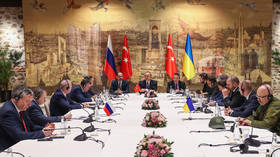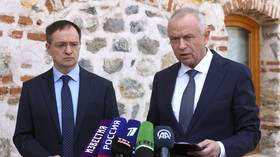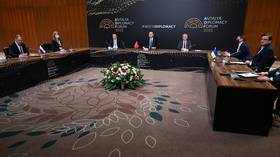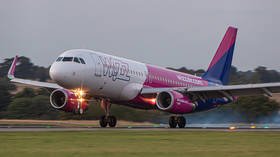Russia’s top negotiator comments on peace-talks outcome

Russia has agreed to meet Kiev half-way and will allow a meeting of its leaders to be held on the same day that the final version of a peace treaty is pre-approved by the two nation’s foreign ministers, Moscow’s top negotiator said on Tuesday, after a new round of talks in Istanbul.
Previously, Moscow had insisted that a meeting between Russian President Vladimir Putin and his Ukrainian counterpart Volodymyr Zelensky could only be set after the deal would be finalized.
Vladimir Medinsky described the talks in Turkey as “constructive” and said his delegation had received a clearly outlined position on what Kiev sought to achieve. The written proposal, which includes Ukraine's pledge to remain a neutral nation and that it will not try to obtain any weapons of mass destruction, including nuclear weapons, will be relayed to Putin, he said.
Coinciding with Medinsky’s statement to the press, the Russian defense ministry announced it was drastically reducing its military operations in some parts of Ukraine, including near the capital, Kiev. The ministry cited “the talks moving into the practical dimension,” as the reason for the change.
Medinsky explained the announcement of a de-escalation on the approaches to Kiev, among other reasons, by the fact that key decision makers are based in the capital.
Russia's top negotiator also underlined that there is a difference between de-escalation and ceasefire.
“This is not a ceasefire, this is our desire to gradually come to a de-escalation of the conflict, at least in these areas, .... and we understand that there are people in Kiev who need to make decisions,” he said.
“We don't want to put this city at additional risk,” Medinsky stressed.
David Arakhamia, Medinsky’s opposite number in the Ukrainian delegation, said Kiev had sought a security guarantee from a number of nations that would work not unlike NATO’s mutual self-defense commitment.
He named the UK, China, the US, Turkey, France, Canada, Italy, Poland and Israel as possible guarantors, and claimed some of them have given their preliminary agreement to serve in that capacity.
The proposed security pledge will not apply to the parts of Ukraine whose status remains in dispute, Arakhamia said. These include Crimea, which Russia considers its territory, and the breakaway Donetsk and Lugansk People’s Republics, which Russia recognized as sovereign states and whose forces are taking part in ongoing hostilities.
Turkish Foreign Minister Mevlut Cavusoglu remarked that he hoped that the outcome of the negotiation would soon lead to a ceasefire and a sustainable political resolution of the crisis.
Last month, Russia launched a military attack on Ukraine over Kiev’s failure to implement the terms of the Minsk ceasefire agreements, and Russia’s eventual recognition of the Donbass republics in Donetsk and Lugansk. The German- and French-brokered protocols had been designed to regularize the status of those regions within the Ukrainian state.
Kiev says the Russian offensive was completely unprovoked and has denied claims it was planning to retake the two republics by force.















